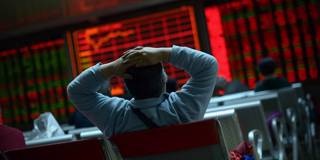Trade tensions are a symptom rather than a cause of the world’s underlying economic and financial malaise. Moreover, an excessive focus on trade could deflect policymakers’ attention from other measures needed to ensure faster and more inclusive growth in a genuinely stable financial environment.
NEW YORK – It’s only a matter of time until the escalating tensions between China and the United States prompt many more economists to warn of an impending global economic recession coupled with financial instability. On August 5, Bloomberg News said that the yield curve, a closely watched market metric, “Blares Loudest US Recession Warning Since 2007.” And Larry Summers, a former US Treasury Secretary who was also closely involved in crisis-management efforts in 2008-09, recently tweeted that “we may well be at the most dangerous financial moment … since 2009.”
Many economists argue that resolving US-China trade tensions is the best way to avoid significant global economic and financial disruption. Yet, while necessary, this would be far from sufficient.
Don’t get me wrong: the focus on the deteriorating relations between China and America is entirely understandable. After all, their worsening dispute increases the risk of a trade war which, coupled with a currency war, would lead to “beggar-thy-neighbor” (that is, lose-lose) outcomes cascading throughout the global economy. As growth prospects deteriorated, debt and leverage issues would come to the fore in certain countries, adding financial instability to an already damaging economic cocktail. And with the US-China row now extending beyond economics to include national-security and domestic political issues, the best-case scenario on trade is a series of ceasefires; the more likely outcome is escalating tensions.

NEW YORK – It’s only a matter of time until the escalating tensions between China and the United States prompt many more economists to warn of an impending global economic recession coupled with financial instability. On August 5, Bloomberg News said that the yield curve, a closely watched market metric, “Blares Loudest US Recession Warning Since 2007.” And Larry Summers, a former US Treasury Secretary who was also closely involved in crisis-management efforts in 2008-09, recently tweeted that “we may well be at the most dangerous financial moment … since 2009.”
Many economists argue that resolving US-China trade tensions is the best way to avoid significant global economic and financial disruption. Yet, while necessary, this would be far from sufficient.
Don’t get me wrong: the focus on the deteriorating relations between China and America is entirely understandable. After all, their worsening dispute increases the risk of a trade war which, coupled with a currency war, would lead to “beggar-thy-neighbor” (that is, lose-lose) outcomes cascading throughout the global economy. As growth prospects deteriorated, debt and leverage issues would come to the fore in certain countries, adding financial instability to an already damaging economic cocktail. And with the US-China row now extending beyond economics to include national-security and domestic political issues, the best-case scenario on trade is a series of ceasefires; the more likely outcome is escalating tensions.